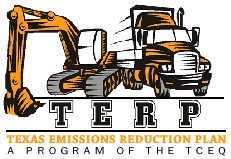The Texas Emissions Reduction Plan (TERP) is the most cost effective way to reduce mobile source air pollution and comply with current and upcoming federal standards for ground level ozone (smog). The Texas Legislature should appropriate all the money that is collected from Texas taxpayers for this purpose to the TERP fund, not let it sit unused in an account. Please call the State Budget Conference Committee leaders (contact information below) to request additional funding for this successful program.
What’s TERP?
TERP, established by the legislature in 2001, collects fees to provide voluntary financial incentives to upgrade or replace older polluting heavy-duty vehicles, off-road equipment, locomotives, marine vessels, and stationary equipment with much cleaner models. The primary goal of the program is to reduce nitrogen oxides (NOx) emissions which react with volatile organic compounds (VOC) in sunlight on hot days to form ground level ozone. Reducing NOx emissions from these sources is less costly than getting similar reductions from major industrial sources.
Why Reduce Smog?
The Environmental Protection Agency (EPA) establishes National Ambient Air Quality Standards (NAAQS) for 6 major pollutants. States monitor air quality and develop state implementation plans (SIPs) to improve air quality meet these standards in areas that currently do not. The Dallas/Fort Worth, Houston, and El Paso metropolitan areas, encompassing 22 counties in Texas, have unhealthy air and do not meet the ground level ozone NAAQS. Non-attainment of these standards can result in federal sanctions impacting the time, cost, and ability for economic growth of large industry, and some transportation projects. That’s on top of the significant health impacts of breathing smog, in the form of asthma and other respiratory illnesses that most severely impact children and the elderly.
The TERP program spurs new technology development and helps create jobs.
Funding TERP
The TERP benefits to Texans have been restricted by not fully appropriating the funds in the TERP account. This year, Texas missed an opportunity to fund more than $100 million in projects to clean up the air because of the lack of appropriations of the TERP funds. By the end of 2015, the TERP account is expected to have an unappropriated balance greater than $1 billion.
The legislature needs to prioritize the additional spending of TERP revenues for their intended purpose when considering its spending cap. TERP funds reduce far more air pollution than any other road or highway project and has broad support – including Texas business associations; petroleum, chemical, manufacturing and natural gas industries; environmental groups; local governments; and many others. Local governments and councils of governments need compliance with clean air standards and “transportation conformity” to get federal funding to build new roads.
Why Now?
Full expenditure of the TERP funds will be even more important in the coming year as the EPA has proposed to lower its ground level ozone standard this summer from 75 parts per billion (ppb) to 65-70 ppb. If the new lower ground level ozone standard is adopted, many more counties in Texas will likely be designated as nonattainment areas. TERP is the most cost effective way to get ahead of the game to avoid restrictions that are detrimental to economic development, transportation projects, and the growth of Texas.
Take Action
Please call Senator Nelson and Representative Otto and ask them for additional TERP appropriations in Article VI of the state budget. When you call Senator Nelson and Representative Otto, who lead the State Budget Conference Committee, please tell them that the TERP appropriation is needed now to improve the health of our air and to avoid additional EPA nonattainment designations.
Representative John Otto, Chairman House Appropriations
Phone: (512) 463-0570
Fax: (512) 463-0315
Chief of Staff: Nikki Cobb, 512-463-0570
Senator Jane Nelson, Chairwoman Senate Finance
Phone: (512) 463-0112
Fax: (512) 463-9889
Chief of Staff: Dave Nelson, 512-463-0112
If you have time and to call the rest of the State Budget Conference Committee members:
Representative Larry Gonzales
Phone: (512) 463-0670
Fax: (512) 463-1469
Chief of Staff: Chris Sanchez (512-463-0670)
Senator Chuy Hinojosa
Phone: (512) 463-0120
Fax: (512) 463-0229
Legislative Director: Josh Reyna (512-463-0120)
Representative Sylvester Turner
Phone: (512) 463-0554
Fax: (512) 463-8380
Chief of Staff: Alison Brock (512-463-0554)
Representative Sarah Davis
Phone: (512) 463-0389
Fax: (512) 463-1374
Chief of Staff: Hunter Hughes (512-463-0389)
Representative Trent Ashby
Phone: (512) 463-0508
Fax: (512) 463-5934
Chief of Staff: Chris Kirby (512-463-0508)
Senator Joan Huffman
Phone: (512) 463-0117
Fax: (512) 463-0639
Policy Analyst: Erin Hornaday (512-463-0117)
Senator Lois Kolkhorst
Phone: (512) 463-0118
Chief of Staff: Chris Steinbach (512-463-0118)
Senator Charles Schwertner
Phone: (512) 463-0105
Fax: (512) 463-5713
Policy Analyst: Kaden Norton (512-463-0105)
Want to do Even More? Call the Speaker of the House and the Lieutenant Governor:
Speaker of the House Joe Straus
Phone: (512) 463-1000
Fax: (512) 463-0675 Fax
Senior Policy Analyst: Erika Akpan (512-463-1100)
Lt. Governor Dan Patrick
Phone: (512) 463-0001
Fax: (512) 936-6700



